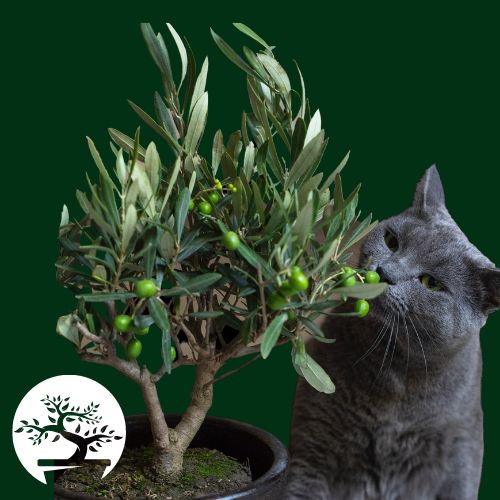Bonsai trees are fantastic additions to any home. However, if you’ve got pets, you’re probably wondering whether or not these plants are safe to bring into your space. Are bonsai trees toxic? Unfortunately, the answer to this is a little complicated.
In short, some bonsai trees are non-toxic to pets and humans, but others can be pretty harmful. Today, we’ll let you know precisely which bonsai trees are toxic and give you some helpful tips for keeping your pets safe around them.
Are Bonsai Trees Poisonous To Cats And Dogs?
If you own a dog or a cat, you know that they will chew through just about everything, especially when they’re young and teething. And, to curious pets, a bonsai tree’s hanging branches and leaves can seem like the perfect toys.
The problem is that many bonsai trees are poisonous to cats and dogs. Therefore, ingesting the stems, leaves, or seeds of the most toxic bonsai trees can be extremely hazardous to a pet’s health.
The primary toxic agent in bonsai trees is cycasin. Cycasin attacks the livers of animals that ingest it. The Sago Palm bonsai tree, for example, has an exceptionally high concentration of this chemical. Therefore, one or two cycasin-containing seeds can cause permanent health damage to your pet and could even result in its death.
Although this sounds very gloomy, you’ll be glad to know that several bonsai trees are entirely non-toxic to animals. And even if you do own toxic bonsai trees, you can take steps to minimize the risk they pose to your pets.
Why Are Some Bonsai Trees Toxic Plants?
If a bonsai tree is toxic, then it means that the mother tree is also poisonous. Out in the wild, plants contain toxins to ward off predators. So an animal that tries to eat a toxic plant probably won’t be coming back for a second bite!
Which Bonsai Tree Species Are Poisonous To Pets?
Sago Palm poisoning can be particularly harmful to pets, but you should be aware of several other poisonous bonsai trees. Some of these species are widely available from bonsai dealers, so you must know which bonsai plants you should avoid.
Jade plant
Jade plants are super popular, easy-to-grow bonsai trees. But, unfortunately, they’re highly toxic to cats and dogs too. Jade plant poisoning can be particularly unpleasant for small animals, and long-term exposure to this bonsai’s toxins can be fatal.
Rhododendron (Azalea)
The Rhododendron bonsai tree, also known as the Azalea plant, is one of the most beautiful bonsai trees you can grow. This beauty comes at a cost, though – all parts of the plant are toxic to cats, dogs, and other pets. Just 0.2% of your pet’s body weight in plant matter can lead to Azalea poisoning.
Boxwood bonsai
The Boxwood bonsai is an excellent beginner’s tree, thanks to its fast growth and hardy nature. However, pet owners should be wary of buying one since the plant’s combination of oils and alkaloids are toxic to cats. Unfortunately, the tree’s taste is similar to some cat nibbles.
Other dangerous bonsai plant species
- Cherry trees
- Plum
- Ficus trees
- Wysteria
- Fig
Which Bonsai Tree Species Are Safe For Pets?
If you want to bring bonsai trees into your home without posing any risk to your pets, then here are some of the bonsai species to look out for:
- Money tree
- Ponytail Palm
- Prayer plant
- Bamboo palm
Symptoms Of Bonsai Poisoning In Your Pet
If your pet ingests seeds or leaves from dangerous bonsai trees, it’s very likely to show some poisoning symptoms. Here are some of the key indicators that could indicate your pet is suffering from bonsai poisoning:
- Struggling with irritation
- Lethargy
- Coughing
- Excess urination
- Excess drinking
- Problems with breathing
- Vomiting
- Slow Heart Rate
- Dilated pupils
- Seizures
- Tremors
- Shivering
- Black stool
- Diarrhea
- Depression
If your pet is experiencing diarrhea and vomiting after ingesting part of a bonsai tree, the toxicity levels are exceptionally high. In this case, you should call your vet straight away.
What To Do If Your Pet Eats A Bonsai Leaf
If you catch your pet eating part of a toxic bonsai tree, then there are a few immediate steps to reduce the chance of poisoning. Firstly, try to extract leaves or stems still in your pet’s mouth. The less amount of toxins they digest, the less harm they are going to suffer.
Encourage your pet to drink water and consider washing their mouth if you’re comfortable doing so. You should never try to force your pet to vomit unless a vet has instructed you to do so.
If any of the symptoms discussed above start to manifest in your pet, you should reach out to your vet immediately. They will most likely request that you take the animal to their practice as soon as possible. If this happens, take a sample of the plant your pet ate with you for the vet to examine.
Are Bonsai Trees Poisonous To Children?
The same bonsai trees harmful to cats and dogs can also be poisonous to humans. That said, caring for bonsai trees is a fantastic way for kids to learn about the natural world.
Of course, keeping a toxic bonsai tree in reach probably isn’t a good idea if you have very young children around.
Should I Avoid Poisonous Bonsai Trees?
If you want a completely non-toxic houseplant selection, avoiding purchasing a toxic bonsai plant is probably your best bet. However, there is no reason to do this if you don’t have pets or young children.
Even if you have pets, that isn’t necessarily a reason not to buy certain miniature trees. As long as they’re in a place your pet can’t reach, the risk of poisoning is very low.
